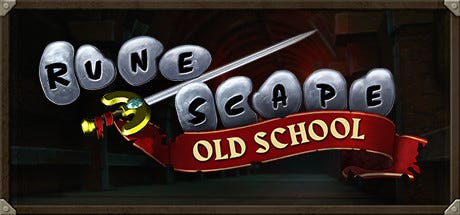How Old School RuneScape Taught a Generation Business, Economics and Human Psychology
OSRS
Abstract
Old School RuneScape (OSRS), launched in 2001, stands as a pioneering MMORPG that, perhaps unintentionally, became a virtual classroom for millions of players. Through its player-driven economy, intricate resource systems, and unscripted social interactions, OSRS provides a unique environment where players can learn principles of economics, business strategy, and human psychology. This paper explores how the game’s design fosters an understanding of market dynamics, risk management, and ethical decision-making, arguing that its unintentional educational value offers insights into the pedagogical potential of game-based learning. By analyzing academic research, player testimonials, and in-game economic data, this study positions OSRS as a valuable case study in virtual experiential learning.
The Player-Driven Economy: A Laboratory for Market Principles
The Grand Exchange and Supply-Demand Dynamics
At the heart of OSRS’s economy lies the Grand Exchange (GE), a centralized marketplace where players trade goods without direct interaction. Unlike traditional MMOs with fixed NPC vendors, the GE operates entirely on player-driven supply and demand. Items such as raw materials, crafted goods, and rare drops fluctuate in price based on collective player activity. For example, the introduction of a new boss requiring specific resources—such as "sharks" for healing—can cause their price to surge due to increased demand. Conversely, oversupply from players farming these items during peak times can lead to market saturation and price drops. This dynamic mirrors real-world commodity markets, where external factors and player behavior directly influence value.
The absence of algorithmic price controls in the GE forces players into speculative behavior. "Merchanting," or buying low and selling high, becomes a viable strategy akin to stock trading. Players analyze historical price data, monitor update announcements, and predict shifts in meta-strategies (such as changes in combat mechanics) to profit. This system teaches players about market timing, liquidity, and the impact of information asymmetry—similar to economist George Akerlof’s concept of "The Market for Lemons," where incomplete information leads to market inefficiencies.
Inflation Control and Resource Sinks
OSRS’s developers, Jagex, actively manage inflation through mechanisms like resource sinks. Skills such as Construction and Herblore require disposable items (e.g., planks, potion ingredients), effectively removing them from the economy. This approach mirrors real-world central bank policies aimed at controlling currency devaluation. For instance, the "High-Level Alchemy" spell converts items into gold at a fixed rate, but its use is balanced by the permanent removal of valuable equipment from circulation. These mechanisms offer players practical insights into monetary policy and the consequences of unchecked inflation, providing a hands-on understanding of macroeconomic principles.
Entrepreneurship and Ethical Decision-Making
Market Manipulation and Cartel Behavior
The open-market structure of OSRS allows for emergent entrepreneurial strategies. Player-run cartels, such as the infamous "OakDice" group, manipulated markets by hoarding specific items (like "yew logs") to artificially inflate prices. These tactics parallel real-world monopolistic practices, where controlling supply enables price manipulation. Players engaged in such activities learned firsthand about market power, collusion risks, and the ethical implications of exploitation.
Scams and Trust-Based Interactions
Before the Grand Exchange, players conducted trades in hubs like Falador Park, fostering both cooperation and deception. Scams, such as "armor trimming" (promising upgraded gear in exchange for items) or "doubling money" (a Ponzi-style scheme), were common. These interactions taught players to critically evaluate trust, recognize fraudulent offers, and develop skepticism—skills that are transferable to real-world financial literacy. Successful trades, however, required building social capital and reputation, underscoring the importance of reliability in economic exchanges.
Game Theory and Behavioral Psychology in Practice
Risk-Reward Calculations and Opportunity Cost
OSRS’s gameplay revolves around efficiency optimization. Players constantly weigh the opportunity cost of time-intensive activities. For example, grinding the Runecrafting skill for slow but steady income versus engaging in high-risk boss battles for rare loot drops. This decision-making process mirrors real-life financial planning, where individuals assess risk tolerance and long-term gains. The concept of "sunk cost fallacy" is evident when players persist in unprofitable activities (e.g., repeated boss attempts without rewards) due to emotional investment, highlighting cognitive biases explored in behavioral economics.
Altruism vs. Exploitation in Social Dynamics
The game’s social fabric oscillates between collaboration and exploitation. Wealthy players often engage in philanthropy, gifting items to newcomers, fostering community bonds. In contrast, "luring" tactics—where players trick others into dangerous zones to steal their items—underscore the darker side of human interaction. These dynamics provide a microcosm for discussing ethical dilemmas, trust-building, and the consequences of antisocial behavior.
OSRS as an Educational Tool: Curriculum Potential
Teaching Economics Through Play
OSRS’s economy offers a tangible framework for understanding abstract economic concepts. For instance, the sudden devaluation of "party hats" after a duplication glitch illustrates market volatility and the role of scarcity. Educators could use such examples to teach supply-demand curves, inflation, and speculative bubbles. Universities like Robert Morris have already integrated game-based learning into economics courses, demonstrating its efficacy in engaging students with interactive models.
Resource Management and Strategic Planning
The game’s skill system requires long-term planning. Players investing hours into leveling skills like Farming or Smithing learn delayed gratification and strategic resource allocation. These lessons parallel real-world project management and financial budgeting, where short-term sacrifices yield long-term benefits.
Ethical and Social Education
OSRS’s unscripted social interactions serve as a platform for discussing digital citizenship. Classroom debates could analyze in-game scams to explore cybersecurity, fraud prevention, and ethical decision-making. Additionally, collaborative activities like clan-based raids teach teamwork, leadership, and conflict resolution.
Conclusion: From Virtual Worlds to Real-World Lessons
Old School RuneScape transcends its role as mere entertainment, offering inadvertent lessons in economics, ethics, and psychology. Its player-driven economy and social dynamics serve as a sandbox for exploring complex systems, making it a powerful tool for experiential learning. While not a replacement for formal education, OSRS demonstrates how games can simulate real-world challenges, fostering critical thinking and adaptability.




